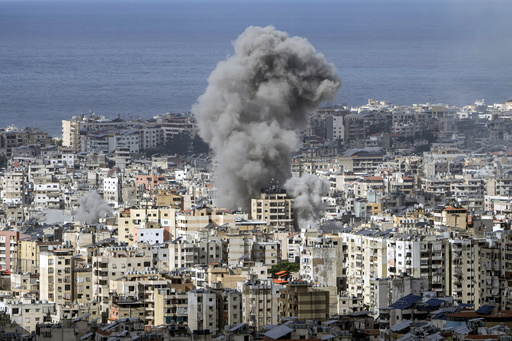
BEIRUT — On Monday, Israel’s military conducted extensive airstrikes across Lebanon, resulting in explosions throughout the region and leaving at least 12 dead. This assault coincides with indications that Israeli officials might be progressing towards a negotiated ceasefire with the Hezbollah group, the key militant faction in Lebanon.
The airstrikes targeted commercial and residential buildings in Beirut as well as in the coastal city of Tyre, focusing on areas traditionally held by Hezbollah. Israeli authorities ordered evacuations in southern suburbs of Beirut, and the attacks were reported close to a Lebanese police station and the city’s largest public green space.
The attack resulted in widespread devastation with massive explosions illuminating Lebanon’s skies, and smoke billowing into the atmosphere as the raids continued in the southern suburbs of Beirut. Buildings sustained heavy damage, and streets were littered with shattered glass and debris. Fortunately, many residents had evacuated beforehand, mitigating potential casualties in some areas.
Strikes were also reported near central Beirut, in regions associated with Christian communities, as well as in Tyre and Nabatieh province. The Israeli military also conducted strikes in the Baalbek-Hermel region of northeastern Lebanon. According to Lebanon’s Health Ministry, these airstrikes in Tyre province have contributed to a grim toll, with the overall death count in Lebanon exceeding 3,700 since the commencement of hostilities two months prior. Health officials noted that many victims were civilians, with some remains so severely damaged that DNA testing would be necessary for identification purposes.
The Israeli military claims they have eliminated over 2,000 Hezbollah combatants. However, the ongoing conflict has displaced around 1.2 million individuals within Lebanon. The recent surge in airstrikes follows an earlier ground invasion of southern Lebanon by Israeli forces in October, which faced significant resistance in a narrow border region. The military had also been involved in cross-border exchanges of fire with Hezbollah, which began its rocket attacks on Israel the day after the Gaza conflict escalated last year.
Lebanese leaders have denounced the relentless airstrikes, asserting that they are obstructing U.S.-facilitated ceasefire discussions. The deputy speaker of the parliament accused Israel of intensifying its bombardment to compel Lebanon into concessions during indirect negotiations with Hezbollah. Elias Bousaab, an ally of the Hezbollah faction, mentioned the heightened pressures as the parties approach a pivotal moment in their quest for ceasefire.
Amidst this turmoil, Israeli officials expressed cautious optimism regarding a potential ceasefire. Mike Herzog, Israel’s ambassador to the U.S., stated on Israeli Army Radio that while some details remained unresolved, both Israel and Hezbollah seemed on the verge of reaching a deal. Herzog mentioned that an agreement could materialize within days.
Israeli authorities are discussing a ceasefire framework that would involve the withdrawal of Israeli forces from southern Lebanon and a retreat of Hezbollah fighters from the vicinity of the Israeli border. However, certain critical issues remain unresolved. Two unnamed Israeli officials revealed that Netanyahu’s security cabinet has a meeting scheduled for Tuesday, but it is uncertain if the cabinet will ratify the proposed deal.
Danny Danon, the Israeli ambassador to the United Nations, conveyed expectation for the ceasefire talks to present stages and discussions among leaders to occur soon. Nonetheless, he cautioned that a resolution would not be immediate. Following earlier setbacks in ceasefire hopes, U.S. officials reiterated that negotiations were still ongoing and anticipated potential last-minute obstacles that could derail or delay agreement.
The current proposal under consideration suggests an initial ceasefire of two months, wherein Israeli military forces would leave Lebanon while Hezbollah would deactivate its armed positions south of the Litani River. This arrangement would reportedly be complemented by an increase in Lebanon’s army presence to patrol the border jointly with the existing U.N. peacekeeping forces.
Western diplomats and Israeli sources noted that Israel insists on the right to conduct strikes in Lebanon if Hezbollah is suspected of violating the terms, a condition Lebanese officials argue would undermine national sovereignty.
Achieving a ceasefire could significantly reduce regional tensions that have escalated since Hamas-led militants invaded southern Israel on October 7, 2023, causing around 1,200 fatalities, predominantly among civilians, and leading to the abduction of nearly 250 individuals.
The absence of a ceasefire poses a significant political challenge for Israeli leadership, including Netanyahu, particularly as 60,000 Israelis remain displaced in northern regions amid ongoing cross-border tensions. Hezbollah’s rocket fire has extended into areas as far south as Tel Aviv, resulting in considerable casualties, including at least 75 deaths—most of them civilian—and over 50 soldiers killed during confrontations in Lebanon.
A ceasefire between Israel and Hezbollah, which is noted as a principal Iranian proxy, is anticipated to greatly alleviate regional instability and mitigate fears of a widespread war involving Iran. The implications of a ceasefire on the Israel-Hamas conflict in Gaza remain uncertain, as Hezbollah previously maintained that it would not agree to a ceasefire until the situation in Gaza is resolved; however, this stance seems to have shifted.
While the deal appears to have a favorable chance of passing in Netanyahu’s security cabinet, dissenting opinions exist, including from National Security Minister Itamar Ben-Gvir, who has expressed firm opposition, labeling any agreement with Lebanon as a grave misstep. Ben-Gvir conveyed on social media that it would represent a missed opportunity to decisively tackle Hezbollah.
If the ceasefire negotiations falter, Jordanian Foreign Minister Ayman Safadi warned that the ramifications would be dire, leading to greater devastation and deepening animosity. Speaking at the G7 summit in Fiuggi, Italy, as U.S. President Joe Biden is set to conclude his term, Safadi predicted that failure to reach an agreement would consign the region to ongoing conflict and suffering.
